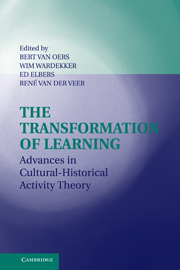Book contents
- Frontmatter
- Contents
- List of Contributors
- Preface
- INTRODUCTION
- SECTION ONE TENETS OF ACTIVITY THEORY
- SECTION TWO IDENTITY, DIVERSITY, AND INCLUSION
- SECTION THREE DYNAMICS OF ACTIVITY AND THE VARIATIONS OF LEARNING
- Introduction to Section Three: Learning in Social Settings: Challenges for Sociocultural and Activity Theory
- 15 Children's Learning through Participation in Institutional Practice: A Model from the Perspective of Cultural-Historical Psychology
- 16 Dialogue for Reasoning: Promoting Exploratory Talk and Problem Solving in the Primary Classroom
- 17 What Kinds of Tools and Resources Are Made Available to Students through Effective Guidance in a Student-Scientist Partnership Program?
- 18 Girls on the Sidelines: “Gendered” Development in Early Childhood Classrooms
- 19 Inscripting Predicates: Dealing with Meanings in Play
- 20 Pretend Play and Preschoolers
- Index
- References
20 - Pretend Play and Preschoolers
Published online by Cambridge University Press: 25 August 2009
- Frontmatter
- Contents
- List of Contributors
- Preface
- INTRODUCTION
- SECTION ONE TENETS OF ACTIVITY THEORY
- SECTION TWO IDENTITY, DIVERSITY, AND INCLUSION
- SECTION THREE DYNAMICS OF ACTIVITY AND THE VARIATIONS OF LEARNING
- Introduction to Section Three: Learning in Social Settings: Challenges for Sociocultural and Activity Theory
- 15 Children's Learning through Participation in Institutional Practice: A Model from the Perspective of Cultural-Historical Psychology
- 16 Dialogue for Reasoning: Promoting Exploratory Talk and Problem Solving in the Primary Classroom
- 17 What Kinds of Tools and Resources Are Made Available to Students through Effective Guidance in a Student-Scientist Partnership Program?
- 18 Girls on the Sidelines: “Gendered” Development in Early Childhood Classrooms
- 19 Inscripting Predicates: Dealing with Meanings in Play
- 20 Pretend Play and Preschoolers
- Index
- References
Summary
THE EDUCATIONAL DIMENSIONS OF PRETEND PLAY
Although the belief that play is educationally important could already be found in the works of Plato and Aristotle, it was only in the eighteenth and nineteenth centuries that Rousseau and Fröbel, with their pedagogical theories, laid the basis for the construction of educational practices that systematically incorporate playfulness into school education (Brougère, 1998). The discoveries resulting from research in the field of developmental psychology enriched the belief in the educational value of play. This belief corresponds to the liberal progressivist pedagogical concept of Active Education (the New School movement), which, since the early 1900s, has spread throughout the world. Piaget, Vygotsky, Bruner, Usova, and Elkonin are among the most important investigators of the educational dimensions of play, and their research contributed to the elaboration of the idea of an active pedagogy of play (França, 1990). Today, the study of the interrelationships between play and education has awakened the interest of researchers such as Gilles Brougère, Artin Göncü, Suzanne Gaskins, Barbara Rogoff, Jaan Valsiner, James Wertsch, Keith Sawyer, Tia Tulviste, Bert van Oers, Tizuko Kishimoto, Gisela Wajskop, Ingrid Koudela, Maria Cecília R. de Góes, and Zilma Oliveira.
The investigation of the educational dimensions of play in a historical and cultural perspective seeks to associate pretend play with the historical, material, economic, and political development of the relationships between production and the division of labor in human societies.
- Type
- Chapter
- Information
- The Transformation of LearningAdvances in Cultural-Historical Activity Theory, pp. 380 - 398Publisher: Cambridge University PressPrint publication year: 2008
References
- 2
- Cited by



